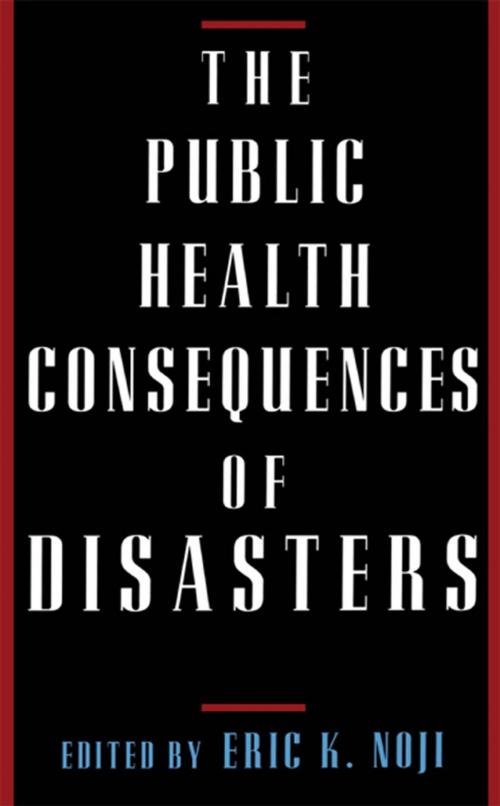The Public Health Consequences of Disasters
Nonfiction, Science & Nature, Nature, Environment, Natural Disasters, Health & Well Being, Medical, Reference, Public Health, Social & Cultural Studies, Social Science| Author: | ISBN: | 9780199880003 | |
| Publisher: | Oxford University Press | Publication: | November 14, 1996 |
| Imprint: | Oxford University Press | Language: | English |
| Author: | |
| ISBN: | 9780199880003 |
| Publisher: | Oxford University Press |
| Publication: | November 14, 1996 |
| Imprint: | Oxford University Press |
| Language: | English |
Natural and man-made disasters--earthquakes, floods, volcanic eruptions, industrial crises, and many others--have claimed more than 3 million lives during the past 20 years, adversely affected the lives of at least 800 million people, and caused more than 50 billion dollars in property damages. A major disaster occurs almost daily in some part of the world. Increasing population densities in flood plains, along vulnerable coastal areas, and near dangerous faults in the earth's crust, as well as the rapid industrialization of developing economies are factors likely to make the threat posed by natural disasters much bigger in the future. Illustrated with examples from recent research in the field, this book summarizes the most pertinent and useful information about the public health impact of natural and man-made disasters. It is divided into four sections dealing with general concerns, geophysical events, weather-related problems, and human-generated disasters. The author starts with a comprehensive discussion of the concepts and role of surveillance and epidemiology, highlighting general environmental health concerns, such as sanitation, water, shelter, and sewage. The other chapters, based on a variety of experiences and literature drawn from both developing and industrialized countries, cover discrete types of natural and technological hazards, addressing their history, origin, nature, observation, and control. Throughout the book the focus is on the level of epidemiologic knowledge on each aspect of natural and man-made disasters. Exposure-, disease-, and health-event surveillance are stressed because of the importance of objective data to disaster epidemiology. In addition, Noji pays particular attention to prevention and control measures, and provides practical recommendations in areas in which the public health practitioner needs more useful information. He advocates stronger epidemiologic awareness as the basis for better understanding and control of disasters. A comprehensive theoretical and practical treatment of the subject, The Public Health Consequences of Disasters is an invaluable tool for epidemiologists, disaster relief specialists, and physicians who treat disaster victims.
Natural and man-made disasters--earthquakes, floods, volcanic eruptions, industrial crises, and many others--have claimed more than 3 million lives during the past 20 years, adversely affected the lives of at least 800 million people, and caused more than 50 billion dollars in property damages. A major disaster occurs almost daily in some part of the world. Increasing population densities in flood plains, along vulnerable coastal areas, and near dangerous faults in the earth's crust, as well as the rapid industrialization of developing economies are factors likely to make the threat posed by natural disasters much bigger in the future. Illustrated with examples from recent research in the field, this book summarizes the most pertinent and useful information about the public health impact of natural and man-made disasters. It is divided into four sections dealing with general concerns, geophysical events, weather-related problems, and human-generated disasters. The author starts with a comprehensive discussion of the concepts and role of surveillance and epidemiology, highlighting general environmental health concerns, such as sanitation, water, shelter, and sewage. The other chapters, based on a variety of experiences and literature drawn from both developing and industrialized countries, cover discrete types of natural and technological hazards, addressing their history, origin, nature, observation, and control. Throughout the book the focus is on the level of epidemiologic knowledge on each aspect of natural and man-made disasters. Exposure-, disease-, and health-event surveillance are stressed because of the importance of objective data to disaster epidemiology. In addition, Noji pays particular attention to prevention and control measures, and provides practical recommendations in areas in which the public health practitioner needs more useful information. He advocates stronger epidemiologic awareness as the basis for better understanding and control of disasters. A comprehensive theoretical and practical treatment of the subject, The Public Health Consequences of Disasters is an invaluable tool for epidemiologists, disaster relief specialists, and physicians who treat disaster victims.















